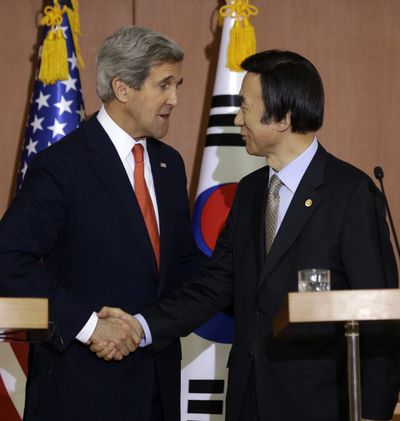Kerry vows to defend U.S. allies
The secretary also pushed for a diplomatic solution

SEOUL, South Korea – The fever pitch surrounding North Korea’s threats of hostile action began to ease Friday, as Secretary of State John Kerry arrived in South Korea to push a diplomatic track that would include China to defuse the tension.
Kerry warned at a news conference alongside South Korean Foreign Minister Yun Byung-se that “North Korea will not be accepted as a nuclear power” and vowed to defend the United States’ Asian allies in the event of a conflict. But he also reiterated that the administration preferred diplomacy, including direct talks with Pyongyang if it agreed to move toward dumping its nuclear program.
“They have to be really serious,” Kerry said. “No one is going to talk for the sake of talking, and no one is going to continue to play this round-robin game that gets repeated every few years, which is both unnecessary and dangerous.”
Separately, in another sign of the softening rhetoric, a U.S. official in Seoul told visiting reporters that there was no indication of an imminent missile launch, no North Korean troop buildup on the border, no extraordinary military exercises and no alarm from foreign diplomats based in Pyongyang. The 28,500 U.S. forces in South Korea weren’t on any special alert.
“The tensions around the world are much more than they are here,” the official said.
The official, who spoke only on the condition of anonymity in order to freely discuss sensitive diplomatic and military topics, added that Pyongyang had even invited foreigners to North Korea to run a marathon and that Seoul was holding its annual spring festival as usual. In fact, the anxiety over North Korea was far overshadowed here by the leaking overnight of a new single by PSY, the South Korean superstar behind the viral smash hit song “Gangnam Style.”
“Given the latest cycle of rhetoric, I’d like to reassure you that we are monitoring the situation very, very closely, and essentially life goes on here in Seoul,” the official said. “We are basically conducting business as usual. We see no escalatory things going on.”
The U.S. official said a missile launch now might actually work toward reducing tensions by giving the young North Korean dictator, Kim Jong Un, “an off ramp,” a way for him to step back from his threats and still save face.
“You could say, ‘I’ve stood up to the United States; I launched a missile. We did this, and now I can safely come back to my people and say, “I am the great leader. I’m like my father, I’m like my grandfather and I have a strong hold on our defense,” ’ ” the official said.
At the White House on Friday, spokesman Jay Carney said North Korea’s behavior was part of a pattern of saber rattling, but that the United States was taking the issue seriously. He said it had taken a number of steps, including postponing the planned test this month of a Minuteman III missile, “recognizing that it could be inaccurately construed by some as an attempt to exacerbate tensions on the Korean Peninsula.”
The move away from hawkish language came a day after a U.S. intelligence report raised alarm about North Korea’s nuclear advancements. Unclassified parts of the Defense Intelligence Agency report that were made public in a congressional hearing stated with “moderate confidence” that North Korea could launch a ballistic missile armed with a nuclear warhead.
The agency wouldn’t confirm or deny the report or its finding, and Army Gen. Martin Dempsey, the chairman of the Joint Chiefs of Staff, told the House Armed Services Committee on Thursday, “I can’t touch that one. Some of it’s classified; some of it’s unclassified.”
Director of National Intelligence James Clapper said in a subsequent statement that North Korea “has not yet demonstrated the full range of capabilities necessary for a nuclear armed missile.”
Pyongyang hasn’t yet tried such a device in the field, and the agency’s report noted that its “reliability will be low.” It was also far from clear whether North Korea’s ability to fit missiles with nuclear warheads, if indeed it can, extends to the sort of intercontinental missile capable of hitting the United States that requires complicated re-entry vehicles to descend to a target.
Kerry and Yun, the South Korean foreign minister, said the North Koreans’ program was worrisome but probably not yet capable of a successful start-to-finish deployment of a nuclear warhead.
“We believe, regarding the nuclear capability of North Korea, it’s quite high,” Yun said. “Nevertheless, at the current time right now, their militarization, diversification, we believe that in that way they probably need to develop a little bit further.”